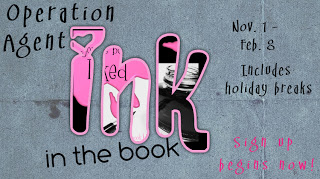Fantastic things are going on over at Ink in the Book, and it's not too late for you to join in. It's called Operation Agent Ink, and it's a great way to work on your WIP and possibly nab an agent, too!
The event runs from November 1st through February 8th, with breaks for the holidays. It's a workshop-style event, and culminates in February with a pitch session with some amazing agents. Best of all, you'll know what the agents are looking for.
Check out all the details of what Operation Agent Ink will do for you so you can decide if it's a good fit for your needs. It doesn't matter if you're starting a new novel, in the editing stage, or all finished.
The event runs from November 1st through February 8th, with breaks for the holidays. It's a workshop-style event, and culminates in February with a pitch session with some amazing agents. Best of all, you'll know what the agents are looking for.
Check out all the details of what Operation Agent Ink will do for you so you can decide if it's a good fit for your needs. It doesn't matter if you're starting a new novel, in the editing stage, or all finished.
The workshops running through the event include:
Novel Writing From the Beginning
Novel Writing: Wading Through the Middle
Creative Inspiration
Revisions and Edits
The Submission Process
Agent Interviews and Thoughts
Novel Writing: Wading Through the Middle
Creative Inspiration
Revisions and Edits
The Submission Process
Agent Interviews and Thoughts
Check out the links to workshop downloads and a list of literary agencies already committed to participate. And here is the first wish list from some of the participating agents.
If you're interested, you can sign up now, until November 7th. Only those who sign up will be able to pitch to the agents in February. This is a great opportunity that goes hand-in-hand with NaNoWriMo, for those participating. Since it's spread over several months, it won't eat all your time.
Are you up for Operation Agent Ink?




















